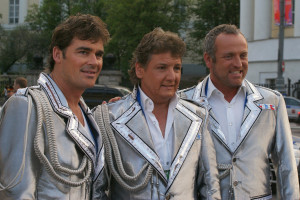crime reporter [noun] [de misdaadverslaggever, de misdaadverslaggevers] [‘mis-daad-ver-slag-gee-vur’]
"Misdaadverslaggever" is composed of "misdaad" and "verslaggever". The first translates to
"crime", the latter to "reporter" (literally to "somebody who gives report").
 The Netherlands have a famous "misdaadverslaggever": Peter R. de Vries. He used to be just a BN’er, but after – as he put it in his tv show about two weeks ago – "having solved the Natalee Holloway" case, he is now also a bit known in the USA. He appeared in Larry King’s show and a few other shows.
The Netherlands have a famous "misdaadverslaggever": Peter R. de Vries. He used to be just a BN’er, but after – as he put it in his tv show about two weeks ago – "having solved the Natalee Holloway" case, he is now also a bit known in the USA. He appeared in Larry King’s show and a few other shows.
By the way, Peter R. de Vries is a very serious crime reporter and he has
solved a few big cases in the Netherlands, in one of them setting two men free from jail.
Examples:
– "Mijn vrouw is misdaadverslaggeefster en de laatste tijd is zij steeds minder vaak thuis ‘s avonds."
("My wife is a crime reporter and lately she is away in the evenings more and more." Lit. "and lately she is at home in the evenings less and less often".)
– "Ik vraag me af of misdaadverslaggever een populair beroep geworden is na het succes van Peter R. de Vries…"
("I wonder if the profession of crime reporter has become popular after the success of Peter R. de Vries…")
– "Weet jij nog meer misdaadverslaggevers dan Peter R. de Vries?"
("Do you know of more crime reporters than Peter R. de Vries?")
Related words:
– "Journalist": journalist.
– "Crimineel": criminal [noun, adjective].
– "Verslag": report.
– "Verslaggeven": to report.
Extra:
Peter R. de Vries announced having solved the Natalee Holloway case a few days
before his television show on the Dutch tv channel SBS6. In the days prior to the broadcast, the hype grew and as a result more than 7 million Dutch watched his show: a new record for a
non-sports television programme.
So what was all the fuss about? The main suspect in the case, Joran
van der Sloot, basically didn’t open his mouth during interrogation by
the police. Peter R. de Vries got somebody to go undercover and pretend to be his friend
and this new ‘friend’ managed to get Joran to talk. One of the things
that was mocked a lot after the show was the funny Dutch Joran and his
‘friend’ spoke: a mix of Dutch, Papimiento (the spoken language of the
Netherlands Antilles) and local (Aruban) slang. Check out this youtube video to see a part of Joran’s confession.
And as is the usual case in the Netherlands, we talked about it for
a week and now we just ride our bicycles again. Joran van der Sloot has
not been arrested, because his ‘confession on tape’ was deemed inadmissible as evidence.

 “Afzakkertje” generally stands for one last drink. Translation depends on context, see 1. and 2.
“Afzakkertje” generally stands for one last drink. Translation depends on context, see 1. and 2.
